Detention Of Father Of Executed Iranian Protester Sparks Concerns
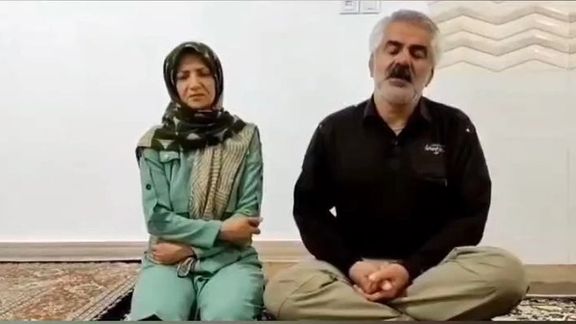
Mashallah Karami, the father of Mohammad Mehdi Karami, an Iranian protester who was executed, has been in detention for more than 50 days with no news on the charges against him.

Mashallah Karami, the father of Mohammad Mehdi Karami, an Iranian protester who was executed, has been in detention for more than 50 days with no news on the charges against him.
The Iranian judiciary has refrained from issuing any official statements regarding the reasons behind his arrest. Unofficial reports suggest that Amir Hossein Kouhkan, the attorney representing the Karami family, was detained alongside him, exposed to harsh conditions, and even contemplated self-harm while in custody.
In recent days, social media users have rallied around the hashtag #MashallahKarami to shed light on his unjust detention. Legal professionals have also voiced their concerns regarding Kouhkan's arrest.
Siyamak Azami, the brother of Sepehr Azami, one of the protesters who lost their lives during the nationwide demonstrations in 2021, took to the social media platform X to disclose that both Mashallah Karami and Kouhkan are being held "in a cramped eight-square-meter cell," facing "multiple charges."
Azami further revealed that the Karaj prosecutor suggested they remain in solitary confinement until they admit guilt, fueling concerns they, like so many others, will be driven to forced confessions on trumped up charges.
The legal organization Dadban, which provides legal assistance to families of protesters and detainees in Iran, released a video featuring Karami at his son's gravesite, writing, "His crime was advocating for justice and visiting his son's grave."
Mashallah Karami was arrested in August when forces raided his home. He and several other family members were arrested as well as having confiscated all their electronic devices, including laptops and mobile phones.
Mohammad Mehdi Karami was executed on January 7, along with protester Mohammad Hosseini for participating in protests and allegedly being involved in the killing of Ruhollah Ajamian, a Basij member present at the 40th-day memorial ceremony for Hadis Najafi, another victim of anti-regime protests in Karaj.
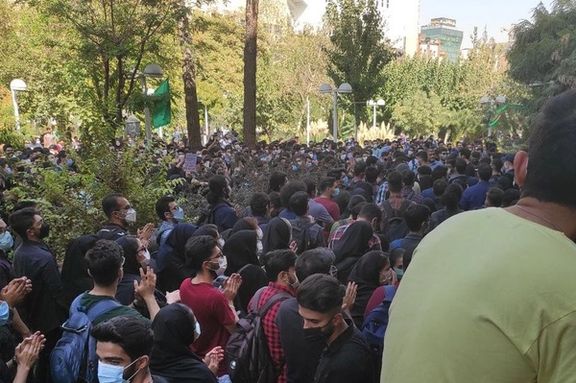
Iran's ongoing crackdown on dissenting academics has seen two prominent literature professors from Ferdowsi University of Mashhad expelled.
Mahshid Gohari Kakhaki, a distinguished literature PhD holder and lecturer at Ferdowsi University of Mashhad, known for her published works, and Mersedeh Eslami, a dedicated literature graduate and lecturer, were the latest victims of the recent wave of suspensions and expulsions just weeks into the new academic year.
It is the second time they have been expelled, the literature department overturning the decision once before, but this time, it was unable to fight the university's final decision.
In a joint statement published on Monday, the two professors expressed their shock, stating, "We hadn't even set foot in our classrooms, let alone the chance to ignite the flames of awareness and knowledge, when we received the disheartening news of our collaboration being terminated once again."
The dismissals occurred without prior notification, raising concerns and further unsettling the academic community. The alarming move comes in the wake of widespread national demonstrations, ignited by the tragic death of Mahsa Amini during her detention by morality police in September 2022.
The protests have led to the removal of dozens of academics, with student councils denouncing it as part of a broader initiative to "purify universities across the nation." The move has the blessing of hardliners in the government and parliament, who call the dismissal of educators and state employees "purification".
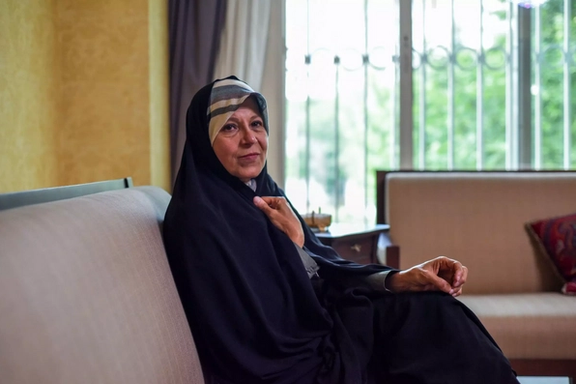
Daughter of former Iranian president Hashemi Rafsanjani has written a harshly worded letter addressed to Iran’s ruler Ali Khamenei, telling him “Enough is enough!”
Enumerating the names of some of the iconic victims of the regime, jailed MP-cum-activist Faezeh Hashemi Rafsanjani asked the Supreme Leader, “How many Nedas, Navids, Mahsas and Armitas must be sacrificed and how long this destruction must continue until you realize the severity of the situation?"
"If you have no compassion for the people of this country, be concerned about your own position," read parts of the letter a copy of which was obtained by IranWire.
Hashemi, daughter of late President Ali Akbar Hashemi Rafsanjani, was arrested in September 2022, days after nationwide anti-regime protests broke out, as the government tried to control the situation by detaining well-known critics and many journalists. She was sentenced to a five-year prison term in January.
She told Khamenei that he has brought Iran to the “peak of oppression and discrimination, poverty and corruption, hypocrisy and immorality, mismanagement and inefficiency” and criticized the regime for its “terrorist” acts.
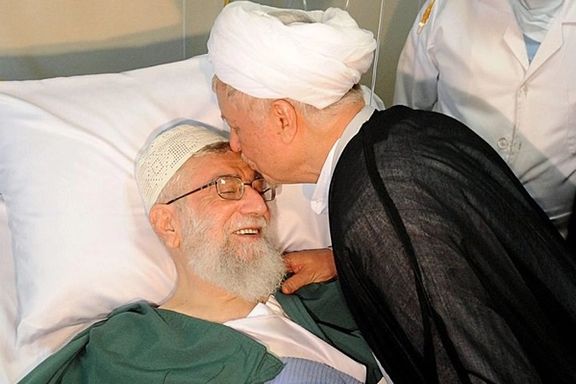
Faezeh’s father – who died mysteriously in a swimming pool in 2017 – was the second most powerful man in the Islamic regime in the 1990s and early 2000s, when he served as president (1989-1997) and held influence and key positions, until Supreme Leader Ali Khamenei gradually pushed him aside. Rafsanjani was the key cleric who helped Khamenei succeed the founder of the Islamic Republic, Ruhollah Khomeini when he died in 1989, although Khamenei did not have the required clerical rank and credentials for the post. Khamenei’s men continued to persecute members of the Hashemi clan, who had become affluent and had legal vulnerabilities that could be exploited by Khamenei’s courts and intelligence services. Faezeh Hashemi who served as a member of parliament, became increasingly estranged from the regime and began defending women’s rights and hurling criticism at the regime, indirectly targeting Khamenei.
Elsewhere in her letter from prison, Hashemi listed the mistakes made by the last shah of Iran that culminated in the collapse of the Pahlavi dynasty in the 1979 revolution and the establishment of the Islamic Republic. She told Khamenei that he is making the same mistakes and more. She said a lack of flexibility in politics and resistance against social demands will only lead to people’s revolt and an end to autocracy.
Hashemi specifically mentioned the case of Armita Geravand, a teenage girl in coma in a heavily guarded hospital following an encounter with hijab enforcers. Armita allegedly fell into a coma after being assaulted by hijab enforcers on her way to school at a Tehran subway two weeks ago. Authorities have significantly restricted the family's access to Armita at Fajr military hospital. Armita’s mother was briefly detained by security authorities earlier this month after protesting the authorities’ refusal to allow her to see her daughter.
Armita’s serious head injury, which authorities claim she sustained when she fainted in a subway car, serves as a stark reminder of the death of Mahsa Amini in September last year. Mahsa's death ignited months of protests and unrest across the country, and the government is still refusing to accept responsibility for it. The news of another young girl's life-threatening injury, along with televised interviews with her parents and classmates, which many believe were "forced," has outraged many Iranians who are being kept in the dark about her circumstances.
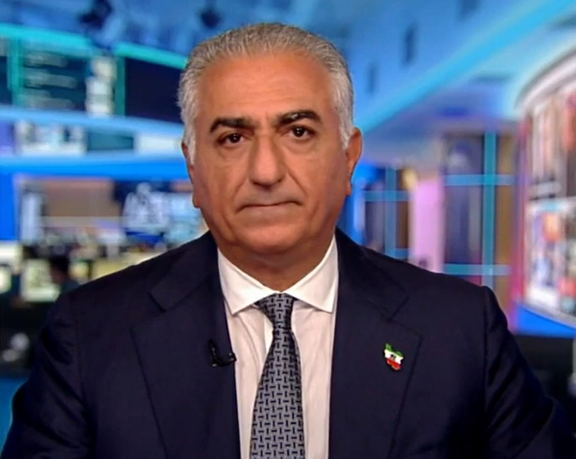
Iran's exiled Prince Reza Pahlavi says the crisis in the Middle East can be solved by putting pressure on the regime, the engine behind numerous regional terror groups.
Pahlavi, who appeared on Fox News on Sunday, stated that the crisis in the region is a symptom of the cancerous Islamic Republic regime. “If you want to solve and cure the cancer, you have to take the eye of the octopus out and not just fight the tentacles. The ultimate solution is a regime change in Tehran,” he said, referring to Iran’s arms and logistics supply for Hamas -- and many other -- terrorist groups.
Calling for international action against the Islamic Republic over its threats to expand the conflict to "other fronts” against Israel, Pahlavi urged the freezing of Iran's funds that were recently unblocked from a South Korean bank. These oil revenues were frozen under US sanctions and are now held in Qatari banks as part of a prisoner exchange deal between Tehran and Washington.
Pahlavi, who has long campaigned for a secular and democratic Iran, said the US should implement stricter sanctions on Iran to curb Iran’s oil exports. The revenues will be spent on the regime’s “campaign of instability” vie its proxy groups, suppression of the people at home and advancement towards nuclear weapons. The sanctions on Iran's oil exports have been so laxly enforced that Iran's exports have reached record highs in recent months.
Pahlavi, who visited Israel this spring and met with senior officials, including Prime Minister Benjamin Netanyahu, added that one of the main operatives behind the militant attacks is the Revolutionary Guards and called on the US to push its allies to designate the IRGC as a terror group.
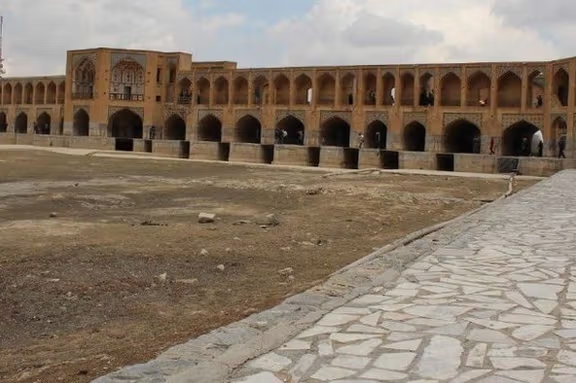
Farmers in Esfahan (Isfahan) have held gatherings within the past few days to protest their water rights, demanding the reopening of the Zayandeh-Rud River.
The river has been a vital source for orchard irrigation in western Esfahan and agricultural use in the east.
In the current Iranian year that began in mid-March, eight separate water releases from the Zayandeh-Rud were carried out to irrigate crops and gardens in western Esfahan.
However, any potential continuation will rely on the formation of a new drought mitigation committee.
In recent days, farmers in eastern Isfahan have joined the protests, echoing their counterparts' demands for the reopening of Zayandeh-Rud. The river, once a permanent waterway, has been transformed into an irrigation channel with sporadic water flow.
Environmental activists and experts are voicing concerns about the detrimental impact of the intermittent management, not only on the river's ecosystem but also on the broader environment.
In recent decades, recurrent droughts and the extensive utilization of underground water and rivers by the agriculture and industrial sectors have significantly aggravated the water scarcity issue in Esfahan in central Iran.
The emphasis on achieving self-sufficiency in agriculture, which includes the cultivation of water-intensive crops like rice and other grains, has also been identified as a contributing factor to the region's water challenges.
Supreme Leader Ali Khamenei, in 2000 and 2001, actively promoted population growth and the attainment of self-sufficiency in wheat and rice production as the primary agricultural objectives, further straining resources.
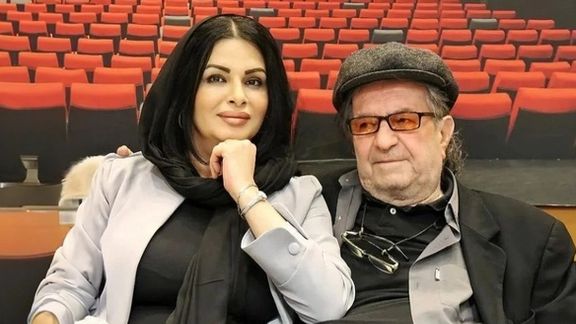
The gruesome murder of celebrated Iranian director Dariush Mehrjui and his wife at their home near Tehran has caused shock in Iran with speculation abounding about the case.
Mehrjui and his wife, Vahideh Mohammadifar, a screenwriter and costume designer, were discovered brutally mutilated in their own home in the Fardis district of Karaj, located approximately 30 kilometers west of the capital, Tehran, on Saturday night.
According to Faraz Daily news website, the perpetrators cut the throats of the pair and broke their arms and legs, and inflicted severe injuries on them. Mehrjui’s head was clobbered with a blunt object and his wife was almost beheaded. Mohammadifar’s arm was also bent from the elbow to the back, and her wounds were deeper, leading the daily to the conclusion that the attackers had a deeper animosity towards his wife.
Mohammadifar had recently reported a confrontation with an apparent burglar outside their home and had received direct threats from the unidentified individual wielding a knife.
Information obtained by Iran International reveals that the Mehrjui couple had been threatened with death multiple times by unidentified individuals in recent days. Although Mehrjui had reported these threats to the police on multiple occasions, the police did not take them seriously.
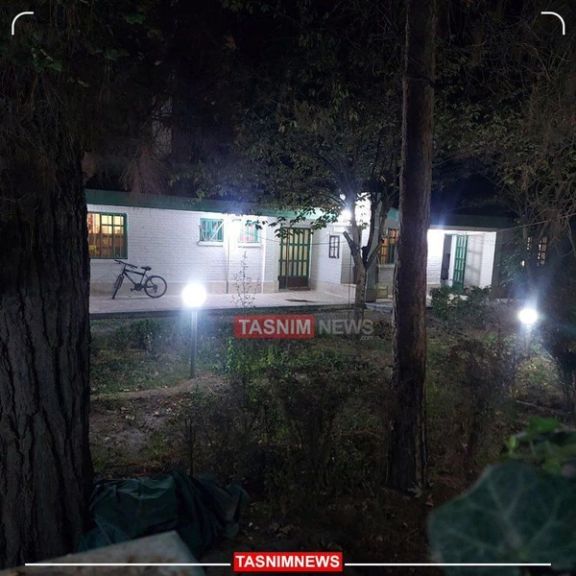
Tasnim news agency, affiliated with the Revolutionary Guards, reported that despite Mohammadifar's social media posts about the threats, the family had not officially filed a complaint with the police. Nasser Khaki, the town's prosecutor, rejected initial reports about beheadings, stating, "This couple were killed due to suffocation, severe bodily blows, and sharp bodily injuries, presumably from a knife."
Khaki claimed that the murders happened between 9pm and 10pm, adding, “We know that the murders likely occurred after opening the house's safe, and that other signs of theft were also evident, and even Mohammadifar's gold jewelry was taken from her hands.”
According to Mona, the daughter who discovered her parents dead, her father had talked to her on the phone at 8.50pm, but when she arrived home at 10.25pm her parents were dead.
In an Instagram post that was apparently published several months ago, Mohammadifar claimed that the burglar who threatened her with a knife had a non-Iranian accent. This detail has led to speculation online suggesting that the perpetrators might be Afghan migrants who live in large numbers in the area.
According to Fars news agency, another IRGC-linked media outlet, four suspects have been arrested for the murder case so far, but none of the detained individuals were foreigners. "Given the nature of the crime and its violence, there is a possibility of personal vendetta. It's possible that the partial theft of gold and mobile phones was carried out with the aim of disguising the true motives," the agency claimed.
There is a conspiracy theory circulating online that the murders are intended to exploit the growing concern about the increasing number of Afghans in Iran and the reported violence, both by them and against them. Mohammadifar mentioned in another Instagram post that she was accused of racism because she complained about being threatened by a foreigner.
Another theory circulating online claims the murders were the continuation of the politically motivated serial assassinations – also known as Chain murders of Iran, a series of 1988–98 murders and disappearances of Iranian dissident intellectuals.
Mehrjui's notable stance against censorship and his vocal opposition to security measures imposed on Iranian cinema were well-documented. In a video message addressing the cancellation of the screening of his film “La Minor” (A Minor), he asserted, "I can no longer endure this. I will mobilize and, alongside my team, stage a protest at the Ministry of Culture. I am ready to fight."
Fans, friends, and coworkers of Mehrjui have expressed their sadness on social media, remembering his work as a pivotal figure in Iran's film new wave during the early 1970s.
"We have just learned of the tragic death of Iranian film director Dariush Mehrjui and his wife, both brutally murdered by thieves," said Jean-Marc Thérouanne, the director of the Vesoul International Film Festival of Asian Cinema in France, in a statement. He noted that several of Mehrjui's movies were screened at Vesoul.
In 1959, Mehrjui moved to the United States to study at the UCLA’s Department of Cinema. He studied there under Jean Renoir. He received many awards, including a Silver Hugo from the Chicago International Film Festival in 1998 and a Golden Seashell at the San Sebastián International Film Festival 1993. Most of Mehrjui’s films are inspired by literature and adapted from Iranian and foreign novels and plays.
In 1959, Mehrjui moved to the United States to study at UCLA's Department of Cinema. He studied there under French cinema giant Jean Renoir. He received numerous awards, including a Silver Hugo from the Chicago International Film Festival in 1998 and a Golden Seashell at the San Sebastián International Film Festival in 1993. Most of Mehrjui's films are inspired by literature and adapted from Iranian and foreign novels and plays.